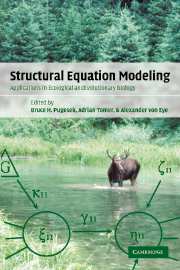Book contents
- Frontmatter
- Contents
- List of contributors
- Preface
- Section 1 Theory
- Section 2 Applications
- 6 Modeling intraindividual variability and change in bio-behavioral developmental processes
- 7 Examining the relationship between environmental variables and ordination axes using latent variables and structural equation modeling
- 8 From biological hypotheses to structural equation models: the imperfection of causal translation
- 9 Analyzing dynamic systems: a comparison of structural equation modeling and system dynamics modeling
- 10 Estimating analysis of variance models as structural equation models
- 11 Comparing groups using structural equations
- 12 Modeling means in latent variable models of natural selection
- 13 Modeling manifest variables in longitudinal designs – a two-stage approach
- Section 3 Computing
- Index
11 - Comparing groups using structural equations
Published online by Cambridge University Press: 14 October 2009
- Frontmatter
- Contents
- List of contributors
- Preface
- Section 1 Theory
- Section 2 Applications
- 6 Modeling intraindividual variability and change in bio-behavioral developmental processes
- 7 Examining the relationship between environmental variables and ordination axes using latent variables and structural equation modeling
- 8 From biological hypotheses to structural equation models: the imperfection of causal translation
- 9 Analyzing dynamic systems: a comparison of structural equation modeling and system dynamics modeling
- 10 Estimating analysis of variance models as structural equation models
- 11 Comparing groups using structural equations
- 12 Modeling means in latent variable models of natural selection
- 13 Modeling manifest variables in longitudinal designs – a two-stage approach
- Section 3 Computing
- Index
Summary
Abstract
This chapter presents methods for comparing structural equation models among groups. It begins by giving a general definition of multigroup analysis and by describing the objectives and utility of this type of analysis. The chapter then introduces an hypothetical example for multigroup analysis that involves the effects of fire on the relationship between soil properties and plant production in ecological communities. An overall description of the steps in a multigroup analysis is presented, which includes the initial assessment of baseline models for the separate groups, followed by tests for invariance in parameters among groups. These procedures are then illustrated using the data from the hypothetical example. Finally, a discussion of the possible uses of multigroup analyses for ecological problems is presented. It is concluded that multigroup analyses using structural equations has a wide range of applications for ecological and evolutionary studies, including both experimental and descriptive data.
Information
- Type
- Chapter
- Information
- Structural Equation ModelingApplications in Ecological and Evolutionary Biology, pp. 281 - 296Publisher: Cambridge University PressPrint publication year: 2003
Accessibility standard: Unknown
Why this information is here
This section outlines the accessibility features of this content - including support for screen readers, full keyboard navigation and high-contrast display options. This may not be relevant for you.Accessibility Information
- 17
- Cited by
